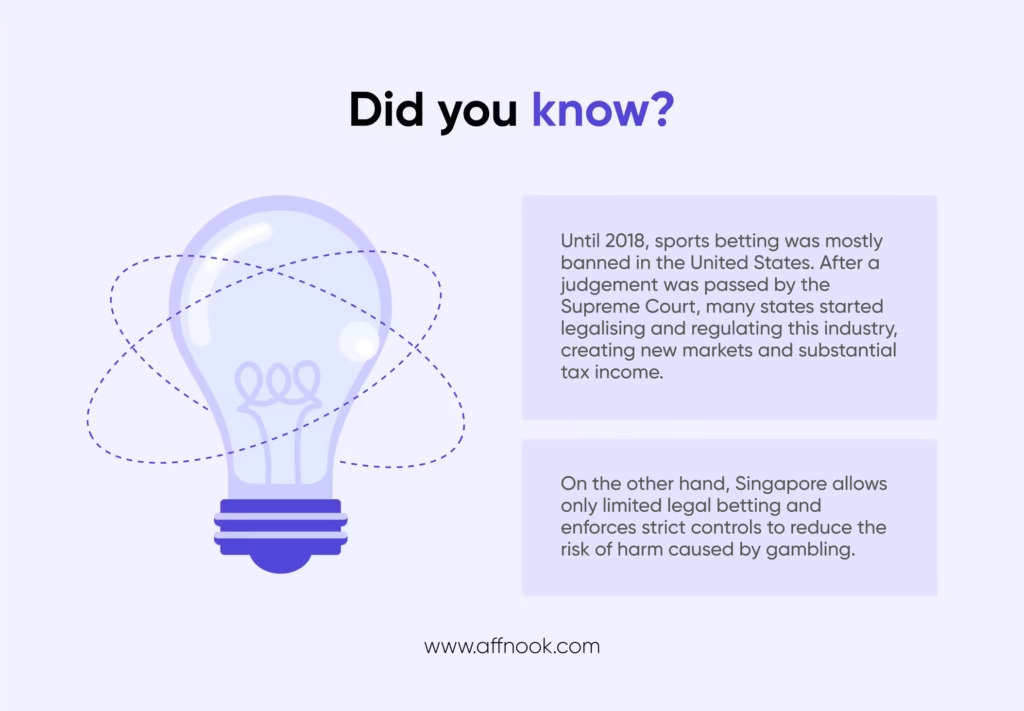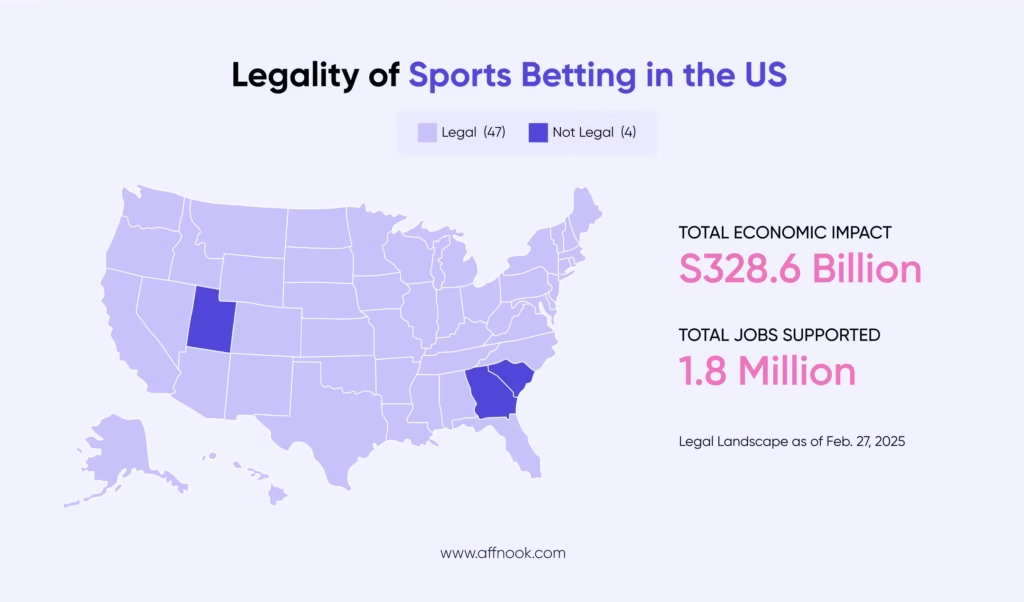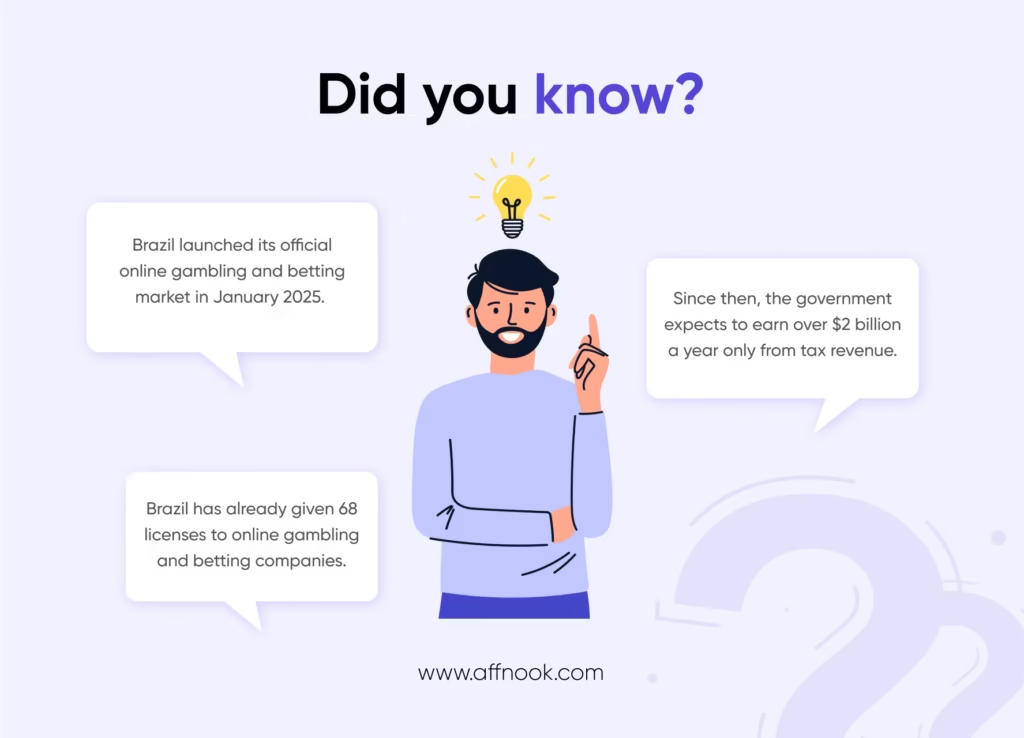Have you ever watched a big match and thought, ‘I know who could be the winner?’ This is what makes sports betting exciting, as people predict the outcome of a sports event and then place a wager (bet) with the intention of winning.
For example, the US generated over $10.92 billion in revenue from legal sports betting in 2023. This number highlights how lucrative and competitive this market is for the companies offering betting services.
But remember, to be successful in this industry, the operators have to do more than just accept bets. They must provide a positive experience for players, comply with all regulations, build acquisition mediums, and maintain a good reputation for their brand.
Additionally, responsible operation helps to gain the trust of bettors and regulators, and this is what is needed for long-term success.
In this article, we will talk about the types of sports betting, where is sports betting legal, and where it is strictly illegal.
Types of Sports Betting

As an operator, if you offer the different types of sports bets, you can attract and retain a wider range of players. Below mentioned are some of the most popular betting options you can provide to your players:
Moneyline Bets:
In this, players just need to choose the team they think might win.
If a player thinks that Team B could win and places a bet of $80 on it, and luckily, Team B wins, the player will win the bet. If Team B loses, so does the player.
Over/Under (Totals):
Players need to bet on whether their assumed number would be higher or lower than the set number.
If the set number is 50 points, the player will bet “over” if they think the score will be more than 50 or “under” if they think it will be less.
Parlay Bets:
This is a single bet that mixes two or more individual bets known as ‘legs’ into a single bet. To win a parlay, the bet of each player in the parlay must win; if even one leg loses, the entire parlay will lose.
If you bet on three games:
- 1st Game: You think Team C will win.
- 5th Game: You think Team A will win.
- 7th Game: You think team D will win.
Instead of placing 3 different bets, you can combine all of them into a parlay bet. Even if one team is lost, you will lose your entire bet.
Teasers:
Just like parlays, but players can push the point spreads in their favour, making it easier to win. However, the winning amount is lower than the traditional parlays.
Suppose you place a bet on two basketball games:
- Game 1: Warriors have -8 points
- Game 2: Champions have +4 points
With a 5-point teaser, you can move the point spread by 5 points in your favour for each game.
- Game 1: Warriors now have -3 points (-8 points originally, now minus 5 points)
- Game 2: Champions now have +9 points (4 points originally, now plus 5 points)
Prop Bets (Proposition Bets):
These are special bets placed on the happening or not happening of an event. However, these are not related to the final outcome.
Consider this: “who will score the first goal”?
When you offer such considerations, you give every customer something to be excited about, hence encouraging them to return and place more bets. You must know the answer to where is sports betting legal. Only then can you provide your services in that region.
Legal vs. Regulated: What’s the Difference?
In the sports betting industry, ‘legal’ and ‘regulated’ are two different terms.
Legal market: Betting is permitted by law in that particular jurisdiction, but you may still need to follow specific regulations or get a license before you can operate legally.
Regulated market: It is a group or authority that makes and enforces those rules for betting businesses. These rules include:
- How do you advertise your services?
- How do you keep bettors or players safe?
- What precautions do you take to keep your player’s data safe?
- What are the measures you take to prevent fraudulent activities such as money laundering?
If you operate in a legal and regulated market, it helps build players’ trust in you, minimizes the risks, and helps you grow your business in a safe and responsible way.
How to Know Where is Sports Betting Legal?
As an operator, you should make sure that sports betting is legal in your area. By following the proper regulations, your business remains protected and your customers’ trust is retained.
Checking Legality
If you are the owner of a sports betting business, then you must identify the regulatory authority in your region. Every country and, in fact, sometimes each state has its own government body that controls betting activities and checks if the betting companies adhere to them.
For example, the regulatory bodies in the American states of:
- New Jersey, is the New Jersey Division of Gaming Enforcement (NJDGE), while
- Arizona has the Arizona Department of Gaming.
The main role of these authorities is to maintain a list of licensed betting companies in their regions and teach them the latest regulations.
Also, it is important to show your license number and the name of your licensing authority either on your website, usually at the bottom of the page. Please note that your license should be clearly visible to the players.
Mind you, always check for new rules from your local regulator so your business remains well within the law.
License Types and Identifiers
As an iGaming operator, it is important for you to understand the different types of licenses that you might need:
- Operator License: You would need this license if you want to legally accept bets in your area.
- Vendor License: This license is required if you sell goods or services to betting companies.
- Employee License: Some regions have regulations that require every employee to hold an employee license if they work in the sports betting business.

If you fail to keep your license current or fail to display it properly, you could face hefty penalties or even license suspension. And if you cannot figure out where is sports betting legal and end up running your business in unregulated gambling markets, you will face serious troubles.
Reasons for Legalizing or Banning Sports Betting Around the World
Why do Countries Make Sports Betting Legal?
- Tax Revenue: When sports betting is legal, the local government can collect taxes from the betting companies. This gives the government the extra funds to support their economy. In fact, legal betting can generate millions or even billions in tax revenue every year.
- Better Customer Protection: Legal betting allows the government to make sure that the games that are being played are fair and safe. This helps protect people from scams, cheating, or situations where companies fail to pay out winnings.
- Job Creation: A legal betting industry creates many new jobs. People get hired to run online betting sites, provide customer support, and work in the IT or marketing department.
Why is there a Ban on Sports Betting in Some Countries?
- Religious Beliefs: The religious rules in some countries strictly prohibit gambling. For example, Saudi Arabia, Qatar, Brunei, and Somalia follow Islamic law, which bans all forms of gambling. Breaking these laws can lead to severe punishments.
- Social Concerns: Some governments worry that sports betting can lead to gambling addiction, crime, and family issues. That’s why countries like China and Cambodia ban sports betting to protect their people and keep their society safe.
Political and Economic Control: Countries like Norway, Poland, and Sweden want to retain control over gambling-related revenue. Hence, only the government can run betting companies, whereas private businesses are not allowed. The profits earned by the government are then used for public welfare.

As an operator, it is important to know the reasons behind these rules. This will help you plan your business and follow the law in each country.
Where is Sports Betting Legal?
To start your business in the iGaming industry, it is important to know where sports betting is legal. To help you better, here is a comprehensive list of countries where sports betting is legal.
North America
- USA:
As of February 2025, there were 47 states where sports betting is legal. Some states allow both online and in-person betting, while others allow betting strictly at physical locations. The American Gaming Association provides an updated map of where sports betting is legal and details about each state’s status.

- Canada:
In Canada, sports betting is legal and regulated, but only at the provincial and territorial level. There is no national regulatory body to oversee sports betting. Betting is mostly offered through government-organised lotteries. However, some provinces in the country allow private operators to run gambling businesses under strict regulation, with the government remaining heavily involved in the oversight operations.
Europe
- United Kingdom:
The UK is one of the oldest countries where sports betting is legal and is also the most established market. It is regulated by the UK Gambling Commission. Here, both online and offline sports betting are legal, but operators need to follow tough rules and regulations to protect their players.
- France, Italy, Spain, Germany, Sweden:
As an operator in countries where sports betting is legal, you can run a sports betting company if you follow these government rules and regulations:
– Obtain the betting license.
– Always pay taxes on time.
– Follow responsible gambling rules so that you can protect your players.
- Ireland, Belgium, Netherlands:
These are the countries where sports betting is legal but tightly regulated. The government checks whether the operator has:
– Proper licensing
– Pays taxes on time
– Prioritize player’s safety

Latin America
- Mexico:
Sports betting is legal and regulated for both online and in-person betting shops. The market is open to both Mexico and international operators.
- Brazil:
Due to rule changes in 2024, sports betting is now legal and expanding rapidly in Brazil. Operators now must be licensed and are required to follow the given rules and regulations to ensure fair play.

Asia
- Philippines:
Sports betting is legal mainly within special economic zones (SEZ) like the Cagayan Freeport. That said, licensed operators can offer their services to foreign players, but domestic online betting is restricted.
- Singapore:
Sports betting is allowed but is fully under control by the state. Only government-licensed operators can offer betting services. Hence, no private company is allowed in the local market.
As an operator, you should be up-to-date with local laws, licensing regulations, and market conditions in each region. Regulations change quickly, so it is important to have the latest information about where is sports betting legal before entering any market.
Places Where Sports Betting is Legal with Stipulations
In some countries or regions, sports betting is permitted but under strict laws and specific regulations:
- India: Most gambling, including sports betting, is technically banned across the country. However, there are states where sports betting is legal, like horse race betting and state-run lotteries.
That said, regulation and enforcement differ among states, which results in a complex and often ambiguous legal landscape.
Graphic 8:
Did you know?
iGaming in India is controlled by each state. For example, Nagaland issues licenses to operators who run skill-based games like online poker, Sikkim permits online casinos and sports betting, and Tamil Nadu has its own rules to regulate local game providers.
However, all operators must also follow national IT rules to keep the games safe, fair, and approved by the government.
- Japan: Sports betting in Japan is highly regulated and limited to a select few sports, namely horse racing, bicycle racing, boat racing, and motorcycle racing—all of which are government regulated. Private and non-government betting activities are generally prohibited.
Did you know?
Most forms of gambling are prohibited under Chapter 23 of the Criminal Code in Japan.
- United Arab Emirates (Dubai): Gambling or sports betting are illegal in Dubai due to religious and cultural reasons as discussed above. However, there are few designated “free zones” where casino and sports betting operators may be permitted but are strictly regulated and aimed at international tourists only.
Countries Where Sports Betting Is Strictly Illegal
As an operator, it is important for you to know that in some countries, sports betting or sometimes all types of betting is completely banned. If you try to run your business in these countries, both you and your customers could have to face serious penalties. These may include fines and imprisonment.
Middle East and North Africa:
– Saudi Arabia, Kuwait, Qatar, Algeria: All gambling, including sports betting, is strictly forbidden. Authorities enforce these laws very strictly, and violators can face severe punishments.
Asia:
– China: Sports betting and most gambling are illegal. The only exception here is the government-approved lotteries. That said, Macau allows casino gambling for tourists—but not sports betting.
– North Korea: Gambling is only allowed for tourists in special casinos. Local citizens are prohibited from gambling at all.
– Thailand: Almost all gambling is banned, except for government lottery and horse race betting. Unlicensed operators face strong policy enforcement. However, now Thailand is looking into making gambling legal by possibly allowing integrated casino resorts.
Why Does Legalisation Matter?
- Legitimacy and Trust: When your betting company is legal and follows the rules, your players will trust you more. This will help you to operate in the long term and work with other organisations such as sports leagues and banks.
- Banking and Advertising: Being a licensed betting operator, you can use regular bank services and may also advertise your services.
- Revenue and Player Protection: Rules make competition fair and stop illegal companies that don’t pay tax or follow safety rules. Additionally, legal betting companies also protect their players by offering tools to limit the player’s time spent on the game, or making sure that only adults can bet.
- Legal Safety: If you are a licensed business, then you are protected from being suddenly shut down or fined and couldn’t get into legal trouble too.
Conclusion
Sports betting is now a fast-growing business all around the world. It is changing how people watch and enjoy their favourite sports, and it offers big opportunities for companies that get the right licenses.
When countries move from illegal or unregulated gambling to legal and well-planned betting, everyone benefits—including the government, players, and betting companies.
To be successful in sports betting in the long run, operators should:
- Know and follow the laws and licensing regulations in each country.
- Protect their players and ensure people bet responsibly.
- Keep up with changes in local or international laws
- Be open and play fair
So, if you are running an online gambling business, ‘playing by the rules’ is about more than just staying safe and out of trouble. It helps you build a strong, trusted, and successful sports betting business for the future.
Remember to always check the laws in your country to answer the question, ‘where is sports betting legal?’ before you start.
Help Centre
In what countries is sports betting illegal?
Across the Middle East, North and Central Africa and large parts of Asia (including China, Thailand and more), sports betting is strictly banned. It isn’t allowed in any form or structure due to a variety of social, legal, cultural and ethical reasons.
How do I identify countries where cricket betting is legal?
To know where is sports betting is legal, you will need to review the laws in the country regarding skill-based and chance-based gaming. Occasionally, some types of iGaming such as social casinos or fantasy gaming are allowed, however, real-money gaming is banned. Without knowing the regulations prevalent in a country or region, it is difficult to gauge its status.
Is sports betting legal in Qatar and other middle eastern nations?
No, sports betting is completely banned across Qatar, UAE, Saudi Arabia and other middle eastern nations. It is not a simple disallowance. Any kind of violation on this front is dealt with strictly by authorities.
What factors contribute to legality or illegality of sports betting?
There are a variety of social, cultural, demographic, economic and religious reasons why sports betting may be allowed or banned. In some countries, like Philippines or Singapore, an outright ban isn’t instated. Instead, the regulations are managed completely by the government. Similarly, in the USA, sports betting is legal on a state-to-state basis. The underlying reasons are many, but if you’re considering launching a sports betting brand, it is critical to understand these rules and how they can impact your business.



